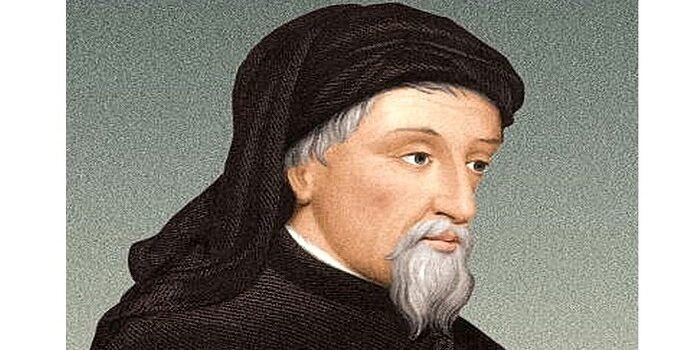The Wife of Bath [Canterbury Tales] by Geoffrey Chaucer -- Summary
The
Prologue to the Wife of Bath
The
wife of bath is the speaker. She has much experience in marriage, she says, as
she has had five husbands. She justifies this fact with rhetoric, quoting from
the bible as a reference. She took both her husbands' money and masculinity.
She is open to a sixth husband! The wife of Bath is very liberal. She evokes
St. Paul who said marriage is a positive thing. She brings up polygamous
biblical men; she says God never expressly forbade multiple marriages.
Virginity, she admits, is valuable but so is procreation according to the bible
and to achieve the latter one must give up the former. She concludes by saying
that she uses her husband as debtor and slave- that she owns him. She possesses
him using the instrument that god gave her (presumably her sexuality).
At
this point the Pardoner interrupts the Wife, saying that he had meant to marry
himself, but didn't- why should he risk his wife controlling him as the Wife of
Bath does her husbands? The wife replies that he should finish hearing her
story and then decide if he wants to get married.
She
continues her story. Her three first husbands were good as they were old and
rich and gave her treasure. She didn't care to please them for pleasure's sake,
but only did so to get money. She manipulated them so that they were glad to do
it, using lies and deceit to get her way. She accused them of cheating and then
pretends to be hurt.
Her
fourth husband had a mistress, and this hurt Alis because she was still
beautiful then. She hated his happiness and made his life a purgatory on earth.
He died while she was on a pilgrimage to Jerusalem.
Her
fifth husband, Janekin, she actually liked. This one was rather more clever,
and wasn't susceptible to her tricks, and even used them on her. He beat her;
she loved him for these things, for the control that he exerted (in contrast
with her other husbands who were putty in her hands). This husband was not
rich; he was a mere clerk at Oxford. He was also twenty while she was forty.
Her confidence begins to falter as we are related the relationship with her
fifth husband, whom she actually loved and had some say over her.
The
Tale of the Wife of Bath
A
knight rapes a woman, and the court is appalled and want to see him
decapitated. However the Queen and other women of the court plead on his
behalf. The king agrees with his wife to give the knight a single chance to
save his life- he has one year to discover what it is that women want most of
all in the world. He sets off to find the answer but all women tell him
different things. When the year is almost up, he meets a hag, a hideous woman,
who says she will help him if he agrees to marry her. Valuing his life, he
consents. He tells the court the answer the hag gave him, that is, that women
desire above all to have their husbands and lovers under their control. The
court agrees this is the correct answer and the Knight is pardoned. He
miserably marries the hag and sleeps with her. She asks him why he is sad, and
he replies that it is because he is married to such an ugly, ignoble woman. The
hag questions the value of blood relations, saying there are repugnant sons of
nobles, and that wealth is all about attitude and not assets. She asks the
knight to choose whether he would have her be loyal and good but ugly or
beautiful but unfaithful. The knight finally decides to let her decide. In
doing so, he gave her that which women want most, and she rewards him by
becoming both beautiful and good (the moral here is that if men will let women
rule over them, good things will come to the men. This is in clear opposition
to the ends to which the Wife of Bath throughout her life utilized her power
over men. Maybe this comes to show that the Wife of Bath knows that her
behavior is not adequate, and gives the protagonist in her stories virtues she
wishes she had). The story ends with Alison imploring Jesus to give all men meek,
beautiful, faithful women.









Comments
Post a Comment
Hey friend! 🌈 I can't help with your assignments but maybe other readers can. Good luck! 🤞